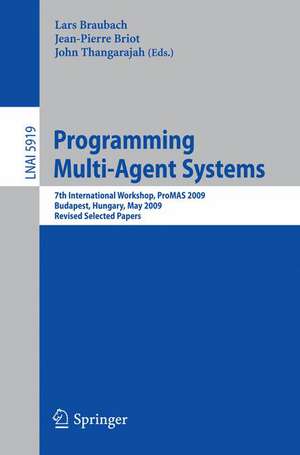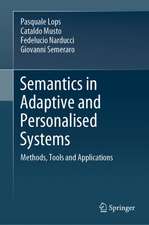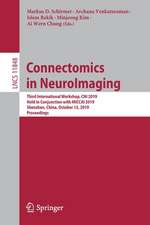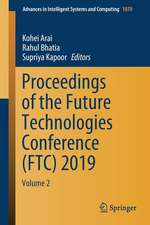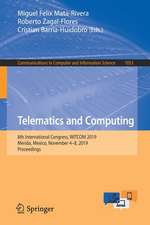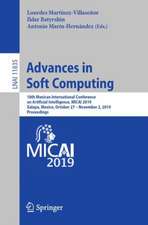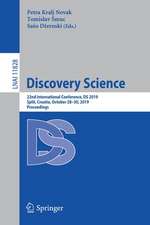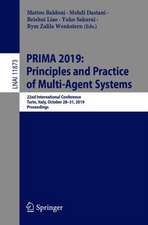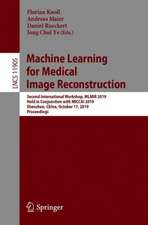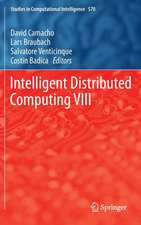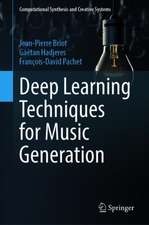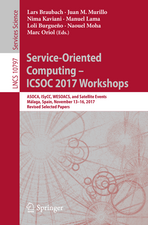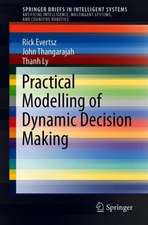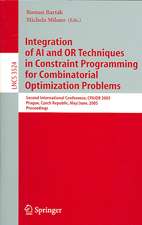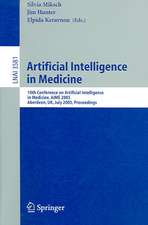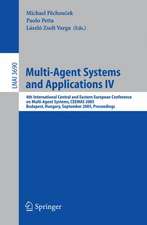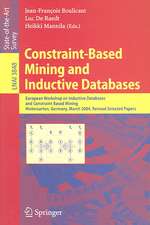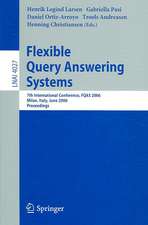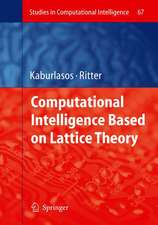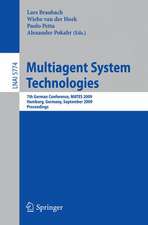Programming Multi-Agent Systems: 7th International Workshop, ProMAS 2009, Budapest, Hungary, May10-15, 2009.Revised Selected Papers: Lecture Notes in Computer Science, cartea 5919
Editat de Lars Braubach, Jean-Pierre Briot, John Thangarajahen Limba Engleză Paperback – 3 sep 2010
Din seria Lecture Notes in Computer Science
- 20%
 Preț: 1061.55 lei
Preț: 1061.55 lei - 20%
 Preț: 307.71 lei
Preț: 307.71 lei - 20%
 Preț: 438.69 lei
Preț: 438.69 lei - 20%
 Preț: 645.28 lei
Preț: 645.28 lei -
 Preț: 410.88 lei
Preț: 410.88 lei - 15%
 Preț: 580.46 lei
Preț: 580.46 lei - 17%
 Preț: 427.22 lei
Preț: 427.22 lei - 20%
 Preț: 596.46 lei
Preț: 596.46 lei -
 Preț: 449.57 lei
Preț: 449.57 lei - 20%
 Preț: 353.50 lei
Preț: 353.50 lei - 20%
 Preț: 1414.79 lei
Preț: 1414.79 lei - 20%
 Preț: 309.90 lei
Preț: 309.90 lei - 20%
 Preț: 583.40 lei
Preț: 583.40 lei - 20%
 Preț: 1075.26 lei
Preț: 1075.26 lei - 20%
 Preț: 310.26 lei
Preț: 310.26 lei - 20%
 Preț: 655.02 lei
Preț: 655.02 lei - 20%
 Preț: 580.93 lei
Preț: 580.93 lei - 20%
 Preț: 340.32 lei
Preț: 340.32 lei - 18%
 Preț: 938.83 lei
Preț: 938.83 lei - 20%
 Preț: 591.51 lei
Preț: 591.51 lei - 15%
 Preț: 438.59 lei
Preț: 438.59 lei - 20%
 Preț: 337.00 lei
Preț: 337.00 lei -
 Preț: 389.48 lei
Preț: 389.48 lei - 20%
 Preț: 607.39 lei
Preț: 607.39 lei - 20%
 Preț: 1024.44 lei
Preț: 1024.44 lei - 20%
 Preț: 579.30 lei
Preț: 579.30 lei - 20%
 Preț: 763.23 lei
Preț: 763.23 lei - 20%
 Preț: 453.32 lei
Preț: 453.32 lei - 20%
 Preț: 575.48 lei
Preț: 575.48 lei - 20%
 Preț: 585.88 lei
Preț: 585.88 lei - 20%
 Preț: 825.93 lei
Preț: 825.93 lei - 20%
 Preț: 763.23 lei
Preț: 763.23 lei - 17%
 Preț: 360.19 lei
Preț: 360.19 lei - 20%
 Preț: 1183.14 lei
Preț: 1183.14 lei - 20%
 Preț: 340.32 lei
Preț: 340.32 lei - 20%
 Preț: 504.57 lei
Preț: 504.57 lei - 20%
 Preț: 369.12 lei
Preț: 369.12 lei - 20%
 Preț: 583.40 lei
Preț: 583.40 lei - 20%
 Preț: 343.62 lei
Preț: 343.62 lei - 20%
 Preț: 350.21 lei
Preț: 350.21 lei - 20%
 Preț: 764.89 lei
Preț: 764.89 lei - 20%
 Preț: 583.40 lei
Preț: 583.40 lei - 20%
 Preț: 649.49 lei
Preț: 649.49 lei - 20%
 Preț: 341.95 lei
Preț: 341.95 lei - 20%
 Preț: 238.01 lei
Preț: 238.01 lei - 20%
 Preț: 538.29 lei
Preț: 538.29 lei
Preț: 333.72 lei
Preț vechi: 417.15 lei
-20% Nou
Puncte Express: 501
Preț estimativ în valută:
63.86€ • 66.85$ • 52.84£
63.86€ • 66.85$ • 52.84£
Carte disponibilă
Livrare economică 15-29 martie
Preluare comenzi: 021 569.72.76
Specificații
ISBN-13: 9783642148422
ISBN-10: 3642148425
Pagini: 297
Ilustrații: XII, 285 p. 57 illus.
Greutate: 0.45 kg
Ediția:2010
Editura: Springer Berlin, Heidelberg
Colecția Springer
Seriile Lecture Notes in Computer Science, Lecture Notes in Artificial Intelligence
Locul publicării:Berlin, Heidelberg, Germany
ISBN-10: 3642148425
Pagini: 297
Ilustrații: XII, 285 p. 57 illus.
Greutate: 0.45 kg
Ediția:2010
Editura: Springer Berlin, Heidelberg
Colecția Springer
Seriile Lecture Notes in Computer Science, Lecture Notes in Artificial Intelligence
Locul publicării:Berlin, Heidelberg, Germany
Public țintă
ResearchCuprins
Communication Models.- Programming Multiagent Systems without Programming Agents.- Elements of a Business-Level Architecture for Multiagent Systems.- A Computational Semantics for Communicating Rational Agents Based on Mental Models.- Formal Models.- Multi-Agent Systems: Modeling and Verification Using Hybrid Automata.- Probabilistic Behavioural State Machines.- Golog Speaks the BDI Language.- Organizations and Environments.- A Middleware for Modeling Organizations and Roles in Jade.- An Open Architecture for Service-Oriented Virtual Organizations.- Formalising the Environment in MAS Programming: A Formal Model for Artifact-Based Environments.- Analysis and Debugging.- Debugging BDI-Based Multi-Agent Programs.- Space-Time Diagram Generation for Profiling Multi Agent Systems.- Infrastructure for Forensic Analysis of Multi-Agent Based Simulations.- Agent Architectures.- Representing Long-Term and Interest BDI Goals.- Introducing Relevance Awareness in BDI Agents.- Modularity and Compositionality in Jason.- Applications.- A MultiAgent System for Monitoring Boats in Marine Reserves.- Agent-Oriented Control in Real-Time Computer Games.
Caracteristici
up-to-date results fast track conference proceedings state-of-the-art report
